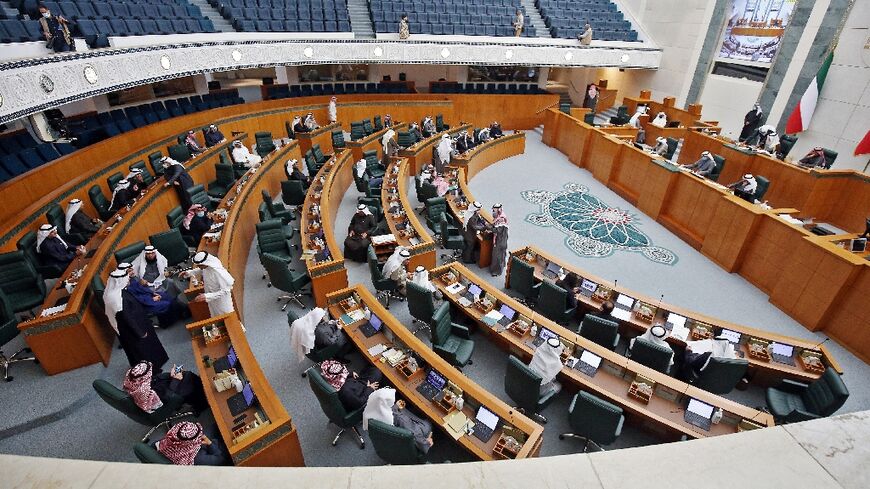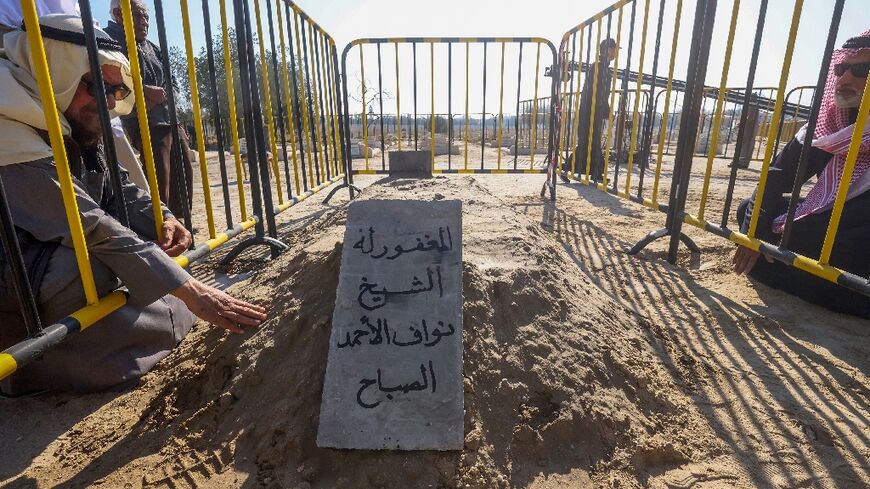Inside Kuwait's political turmoil as parliament dissolves, new government forms
The Kuwaiti emir’s move to dissolve parliament and appoint a government a few days later further deepens years of political instability in the Gulf nation.

Kuwaiti Emir Sheikh Mishal Al-Ahmad Al-Jaber Al-Sabah on Sunday signed a decree approving a new government, days after he dissolved the parliament elected only weeks earlier amid ongoing political turmoil in the small Gulf nation.
The new government — Kuwait’s 46th since 1962 — is headed by Prime Minister Sheikh Ahmed Al-Abdullah Al-Sabah and is made up of 13 ministers. Nine of these ministers have retained their posts from the previous government, including Oil Minister Imad Al-Atiqi, Finance Minister Anwar Ali Al-Mudhaf and Foreign Minister Abdullah Ali Al-Yahya.
In a fiery move on Friday, Sheikh Mishal ordered the dissolution of the opposition-dominated parliament and suspended some articles of the country’s constitution for a period not exceeding four years, during which he said all aspects of the democratic process will be reviewed.
In an address broadcast on state television, the emir said Kuwait has faced “unimaginable, unbearable difficulties and impediments.”
“The recent turmoil in the Kuwaiti political scene has reached a stage where we cannot remain silent, so we must take all necessary measures to achieve the best interest of the country and its people,” he noted. “I will not allow by no means that democracy will be exploited to destroy the state."
According to a royal decree, seven articles of the constitution have been suspended, including Article 107, which stipulates that a new parliament must be elected within two months of its dissolution, and Article 181, which prohibits the suspension of the constitution or the immunity of parliament members.
The decree also stated that the emir and the cabinet will assume the powers of the parliament during the transitional period and that laws will be issued by draft decree.
Years of feud pit parliament, government
Kuwait has been gripped by political disputes for years, which has led to repeated dissolutions of the parliament and government reshuffles.
The now-dissolved parliament was elected in early April. At the time, the majority of the seats (29) was secured by politicians who are part of the so-called opposition in Kuwait, which is seeking changes in the current political systems. Members of Salafist and Islamist parties also secured some seats in the parliament, including the Islamic Constitutional Movement, the Kuwaiti branch of the Muslim Brotherhood, which won one seat. The elections were the third since 2022 and the fourth in five years. The parliament has been dissolved 12 times since 2005, most recently in February.
Lawmakers have repeatedly accused ministers of corruption, while the cabinet blames parliament for blocking development plans for the country.
The frequent political wrangling between the lawmakers and government officials has hindered fiscal and economic reforms as the oil-rich Gulf country seeks to diversify its economy.
The tug of war has also prevented legislation that would allow Kuwait to tap into international debt markets.
Kuwait is a major oil producer, with a production capacity of 3.15 million barrels per day and 8.2% of the world’s oil reserves, according to OPEC data.
Sheikh Mishal appointed Sheikh Ahmed, his nephew, as prime minister on April 15, who was tasked with forming a new government.
But the tensions between the lawmakers and executive authorities has stalled the formation of a new cabinet.
In his Friday public address, Sheikh Mishal accused some lawmakers of rejecting the nomination of certain ministers, stressing that the selection of a prime minister and cabinet members is a constitutional right for the head of state.
“Transgressing the constitution reached a point that could never be tolerated as it risked undermining the constitutional values and the democratic principles,” he said.
The emir also took aim at some officials, whom he did not name, of interfering in the selection of the crown prince. “Some people went as far as interfering into the powers of the emir including his right to select his crown prince,” adding that he retains this right exclusively.
Sheikh Mishal, who came to power in December following the death of his predecessor and half-brother, Sheikh Nawaf Al-Ahmed Al-Jaber Al-Sabah, has yet to name a crown prince.
Kuwait is the only Gulf monarchy with an elected parliament. The parliament, known as the National Assembly, was established in 1963. It is made up of 50 members who serve a four-year term. The legislature has the authority to question and submit no-confidence motions against cabinet ministers, as well as approve the emir’s appointment of a new crown prince.
Laws are also approved by the parliament and the emir.







